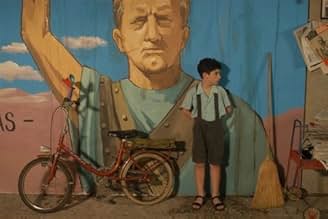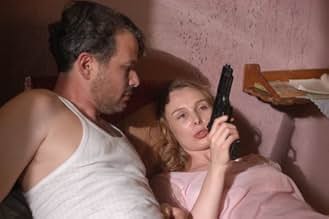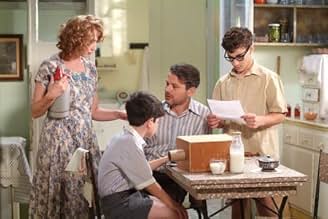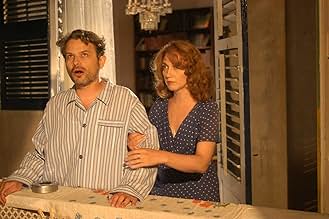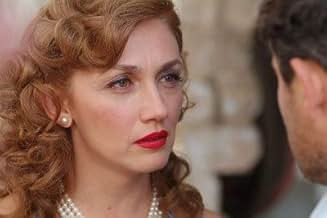In the early sixties, Hilik, a ten years old boy who lives in Tel Aviv, Torn between his fear that his father, a holocaust survivor, would abandon him, and the wish to make him happy. Hilik ... Read allIn the early sixties, Hilik, a ten years old boy who lives in Tel Aviv, Torn between his fear that his father, a holocaust survivor, would abandon him, and the wish to make him happy. Hilik chooses to test his father's love to him, while accepting the risk of loosing him.In the early sixties, Hilik, a ten years old boy who lives in Tel Aviv, Torn between his fear that his father, a holocaust survivor, would abandon him, and the wish to make him happy. Hilik chooses to test his father's love to him, while accepting the risk of loosing him.
- Awards
- 5 nominations total
Evgenia Dodina
- Rivka
- (as Jenya Dodina)
Ella Armony
- Nirit
- (as Ela Armoni)
Esti Nisim
- Batiya
- (as Esti Svidenski)
- Director
- Writer
- All cast & crew
- Production, box office & more at IMDbPro
Featured reviews
10andiam-1
In general, whenever I see an Israeli film I come away with the impression that the Israeli film-makers are superior to their American counterparts in creating real, well-rounded characters. This film is no exception, despite the somewhat far-fetched plot device. The characters seem to be real people, not caricatures. All of the Holocaust survivors in the film are affected by the condition which today we call PTSD, and much of their anxiety is passed on to the next generation. The film avoids the temptation to turn these people into saints, but rather shows them with all of their shortcomings and makes us aware how their character flaws were shaped by their experiences in the Camps. However, the film's creators assume that we know enough about the Holocaust that they do not need to provide more than a brief description of the characters' Holocaust experiences rather than dwelling on them. The film is not about what they suffered but rather how they cope or tried to cope.
At its heart, Dear Mr. Waldman deals with Holocaust survivor Moishe's relationship with two sons, the ten-year-old currently living with him in 1960's Tel Aviv, and the other who perished along with his mother in the camps. On the surface, the living son, Hilik (played by the adorable Ido Port), has the kind of childhood we remember with fond nostalgia. When he's not in with school (with its vivid teachers), he hangs out with a "bad influence" classmate amid the seamy but colorful inhabitants of Tel Aviv's perennially impoverished Florentine neighborhood, and watches Hollywood epics like Spartacus over and over again. But his idyll is spoiled by the ghosts of his father's first family, who in Hilik's nightmares take his father away from him.
The precarious balance tips when Moishe see a newspaper photo of President Kennedy with an adviser whose name is similar to that of his dead son. He is haunted by the absurd notion that this man might actually *be* his dead son, miraculously escaped to America and elevated to high office,and he soon plunges utterly into delusion. It is only with Hilik's help that he is able to break the chains of the past, and reconnect with the land of the living.
Mr. Peled is intimately acquainted with the themes in this movie, because he too had a father whose first wife and young son perished in the Holocaust, and as a son of survivors he too felt an obligation to try to compensate for the horrors his parents went through.
Although the movie deals with Holocaust survivors, it isn't heavy handed or depressing. Instead, the colorful external details of life in Tel Aviv in the 60's are used to set off the main characters' internal struggles.
The precarious balance tips when Moishe see a newspaper photo of President Kennedy with an adviser whose name is similar to that of his dead son. He is haunted by the absurd notion that this man might actually *be* his dead son, miraculously escaped to America and elevated to high office,and he soon plunges utterly into delusion. It is only with Hilik's help that he is able to break the chains of the past, and reconnect with the land of the living.
Mr. Peled is intimately acquainted with the themes in this movie, because he too had a father whose first wife and young son perished in the Holocaust, and as a son of survivors he too felt an obligation to try to compensate for the horrors his parents went through.
Although the movie deals with Holocaust survivors, it isn't heavy handed or depressing. Instead, the colorful external details of life in Tel Aviv in the 60's are used to set off the main characters' internal struggles.
10katz1124
Story of the man's love for a his dead family ( son and wife during the Holocaust), which make him blind to the love of his present family. It is the story of unconditional love of the son to his father. It is also story of the boy growing up in 1960's Tel Aviv, with a great admiration of Kirk Douglas portrayer of cinema version of Spartacus, which cosign him to do several actions carried by the love to his father. It is a very deep movie full of love and nostalgia for Israel of early 1960's. I sow the movie at Chicago Festival of Israeli Cinema, so if you will be able to catch the movie at your local theater or on DVD don't miss it.
Did you know
- TriviaIdo and Rami would later team up again in the movie The little traitor (2007).
- GoofsA boy with a guitar is heard playing "House of the Rising Sun" as popularized by The Animals, whose recording appeared years later than the time when the movie is set.
- ConnectionsReferences Spartacus (1960)
Details
- Release date
- Country of origin
- Language
- Also known as
- Dear Mr. Waldman
- Filming locations
- Tel Aviv, Israel(Exterior)
- Production companies
- See more company credits at IMDbPro
Box office
- Budget
- $1,300,000 (estimated)
Contribute to this page
Suggest an edit or add missing content



